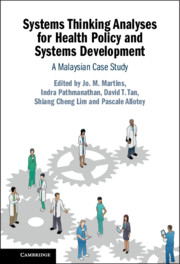This book demonstrates a novel approach to analysing the development of health systems. Using a country case study, it applies systems thinking across an entire health system, engaging with the intersections and interactions of health with a multitude of systems and determinants.
How did we do this? This preface provides a brief summary in the hope that it will be helpful to others who might wish to replicate the process in other-country settings.
The process of producing this analysis was complex, with three phases. First, we required an authenticated account of the historical development of the health system, with evidence of health outcomes. Next, we applied systems thinking analysis to the evolution. Finally, we derived generic ‘lessons’ that would have applications in other-country contexts. We found that the process provided an opportunity for practice-based and reflective learning across policy makers, academics, practitioners, and researchers, encompassing the government (public) sector, the private sector, and non-government organisations.
Challenges abounded. As with most developing countries, Malaysia is not rich in data and documentation, particularly for the earlier decades of its development. Furthermore, the public sector dominates the healthcare system and holds most of the more recent documentation in archives that are not readily accessible to those outside the public sector. To address this challenge, stakeholder engagement and partnership building between the United Nations University International Institute for Global Health (UNU-IIGH) and the Ministry of Health was critical for negotiating access to documents and data. Additionally, one of the criteria for the selection of chapter authors and stakeholders was their personal historic participation in various phases of the development of the health system. Thus they were able to locate key documents and use personal linkages to interact with key individuals to authenticate and elaborate the available documentary evidence.
Another challenge was the in-built reluctance for open discussion between various stakeholders, such as the public with the private sector or between academicians and practitioners. Additionally, the vocabulary and concepts of systems thinkers are strange to healthcare professionals. The interaction process required a ‘safe space’. UNU-IIGH provided such a safe space. Being a neutral organisation with the mandate to support analyses, evidence generation, and capacity strengthening in global health within the UN and member states, UNU-IIGH was ideally placed to co-ordinate the process of production and contribute to the analysis. As one of fourteen institutes in the UNU system, UNU-IIGH retains intellectual independence from the UN and is able to host rigorous academic debate and analysis. Malaysia hosts UNU-IIGH because of the strength and the ethos of the Malaysian health system, which facilitated access to both content and engagement and made for a rich mutual learning experience.
Various health system experts needed to interact repeatedly with analytic systems thinkers. Chapter 2 describes how this process enriched the analysis. This safe space also encouraged key stakeholders (listed in our acknowledgements) to review and comment on the initial analysis and tentative conclusions in each chapter. Subsequent analysis integrated their inputs.
Finally, the editorial team participated actively with chapter authors and stakeholders throughout this process. Thus, as a team, the editors were able to derive the generic key messages shown in each chapter, and these reflect the various components of the system as well as the system as a whole.
We hope the outcomes of the analysis will be useful not only to further the science of applying systems thinking to health systems but also to support policy makers as they seek to better understand their own health systems and address current problems.

